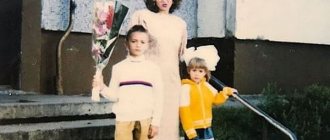Education
If we consider Simonov’s brief biography, it is important to note that after completing seven years of school, the writer studied to become a turner. Then in the life of Konstantin Simonov, in 1931, he moved to Moscow, after which he worked at the plant until 1935.
Around the same time, Simonov’s first poems were written, and his works were published for the first time in 1936.
After receiving higher education at the Gorky Literary Institute (1938) and completing graduate school, he went to the front in Mongolia.
Creativity and military career
In 1940, Simonov’s first play, “The Story of a Love,” was written, and in 1941, the second, “A Guy from Our Town.”
Konstantin Simonov studied at war correspondent courses, then, with the beginning of the war, he wrote for the newspapers “Battle Banner” and “Red Star”.
Throughout his life, Konstantin Mikhailovich Simonov received several military ranks, the highest of which was the rank of colonel, awarded to the writer after the end of the war.
Some of Simonov’s famous war works were: “Wait for Me,” “War,” “Russian People.” After the war, a period of business trips began in the biography of Konstantin Simonov: he traveled to the USA, Japan, China, and lived in Tashkent for two years. He worked as editor-in-chief of the Literaturnaya Gazeta and the New World magazine, and was a member of the Writers' Union. Films were made based on many of Simonov's works.
Two words. "Wait for me". Konstantin Simonov. November 28
Chronicle of one poem. My very poets, or My “romance” with poetry
Text: Dmitry Shevarov Photo: Konstantin Simonov. Poems. Series “My Most Poems”. M., “Slovo”, 1996
Wait for me. Just two words. Seven letters that contain a whole universe of love and pain.
“Wait for me” we don’t even remember from school, no. We were born with these lines. It contains everything that preceded our birth: love, war, separation, distant places, yellow rains... And then, not our grandfathers and fathers, but we whispered these lines. After all, we were not deprived of separations. And even if they were not so long and terrible, our eyes also said to our loved ones: “Wait for me and I will return...”.
Such a familiar, such a familiar poem, but we don’t really know the circumstances of its writing. We only remember that “Wait for me” is addressed to Valentina Serova. The rest is somehow lost in the fog. Or in the dust.
* * * When asked to tell about the history of the poem “Wait for Me,” Simonov was especially reserved and taciturn. From a letter from K.M. Simonov to the reader, 1969: “The poem “Wait for Me” has no special history. I just went to war, and the woman I loved was in the Urals, in the rear. And I wrote her a letter in verse. Then this letter was published in a newspaper and became a poem..."
In 1977, answering questions from Komsomolskaya Pravda, Konstantin Mikhailovich said about “Wait for Me” even more briefly and sharply: “If I hadn’t written it, someone else would have written it.” It seemed that he was offended when they said about him: “But here is the author of “Wait for Me.” Another poet would have beamed with pride, but Simonov darkened his face and remained silent. What was he thinking about in those seconds? What did he see?
“Wait for me and I’ll come back, just wait a lot...” - this is how they said goodbye to brides and wives in the hot summer of 1941. And he, Simonov, was only one of those who said goodbye. Yes, he wrote
lines that have become a prayer for millions of people. But this is because poetry was his work, and others had no time for poetry. And also because he saw the war before many others and realized that it would be long. That’s why I wrote in July: “Wait until the snow is swept away...” And the poems appeared through the paper like blood through bandages...
At all meetings with readers, he was invariably asked to read “Wait for Me,” and not everyone understood why it was so difficult for him.
“...I read it hundreds of times both during and after the war,” recalled Konstantin Mikhailovich, “And finally, after
Twenty years after the war, I decided never to read this poem again. Everyone who could return has returned; there is no one else to wait for. Which means it’s too late to read. So I decided to myself. And I didn’t read for more than a year, until I ended up in the Far East with merchant sailors, fishermen and submariners who left home for the sea for several months, and sometimes more. There, at the very first meeting, they demanded that I read “Wait for Me.” Already in a different way than once during the war, the poem still continued to respond to the spiritual needs of people who had their own reasons for this. For myself, it was still connected only with those days of the war when it was written, and in my soul, when I looked into the hall while reading, I retained a feeling of some kind of guilt before those who waited and everything. I couldn’t wait..."
* * *
On June 22, immediately after Molotov’s speech on the radio, Simonov arrived at the assembly point with a duffel bag. After all, he already has two military missions under his belt (Khalkin Gol and Finnish) and courses for military officers at the Frunze Academy. He doesn't fuss and seems experienced and calm.
As a military correspondent, he receives an appointment to the newspaper "Battle Banner". He drives out to the front, which is rolling towards him. In those days, entire divisions went missing. He will never find his own editorial office; he will begin to transmit notes to Izvestia and Krasnaya Zvezda. On July 12-14, near Mogilev, Simonov found himself at the location of the 388th regiment, which heroically stood in the way of the German avalanche. Regiment commander Colonel S.F. Kutepov, fearing for the life of the correspondent, orders him to leave the front line.
Simonov returns to Moscow. Only after the war he learns that Kutepov’s entire regiment died in unequal battles. On July 18, Simonov’s essay about Kutepov’s fighters was published in Izvestia, he read it and stayed overnight in the editorial office. He had nowhere to go - both his parents and Valentina Serova were already evacuated. The next day, in the editorial corridor, he meets Lev Kassil, who, having heard about Simonov’s homelessness, takes him to his place.
Kassil lived in Peredelkino in house number seven on Serafimovich Street. Wooden cottage. On the ground floor there is a kitchen, on the second there is a bedroom and an office. Having barely had time to sleep, Simonov goes to the front from Izvestia, sees Vyazma, Yelnya, Dorogobuzh burning...
Returns July 27th. Dictates into the room. Spends the night in Peredelkino. He is awaiting orders for a business trip from Krasnaya Zvezda, where he will then serve until 1946. He sleeps, smokes, writes a diary and poetry. Among them - “Do you remember, Alyosha, the roads of the Smolensk region...” and “Wait for me.”
Shows poems to Red Star editor David Ortenberg. He takes “Do you remember, Alyosha...”, and about “Wait for me” he says: “These poems are not for a military newspaper. There is no point in poisoning the soul of a soldier - separation is already bitter! Simonov hides the poems in his field bag.
* * * From the autobiography of K.M. Simonova: “Due to my duty, I was at the following fronts at different times. 1941: June-July - Western Front; August-September - Southern Front, Primorsky Army -
Odessa, Special Crimean Army - Crimea, Black Sea Fleet; October and November - Murmansk direction of the Karelian Front, Northern Fleet; December - Western Front..."
At the beginning of August 1941 he was in Sevastopol. He goes on a combat mission on a submarine for ten days. Business trips follow one after another. In October he was sent to the Northern Front, to Murmansk. There he apparently reads “Wait for Me” aloud for the first time - photojournalist Grigory Zelma asks him to do this. For him, he rewrites a poem from a notebook and puts the date: October 13, 1941, Murmansk.
Then Simonov recalled: “I believed that these poems were my personal business... But then, a few months later, when I had to be in the far north and when snowstorms and bad weather sometimes forced
sitting for days in a dugout somewhere... I had to read poetry to a variety of people. And a variety of people, dozens of times, in the light of a smokehouse or a hand-held flashlight, copied on a piece of paper the poem “Wait for me,” which, as it seemed to me before, I wrote only for one person ... "
November 5 Simonov reads “Wait for me” to the artillerymen on the Rybachy Peninsula, cut off from the rest of the front. Returning to Murmansk, he meets naval intelligence officers and they take him on a raid behind German lines. Before this, he is ordered to hand over all documents, photographs, and notebooks. “When necessary, a nameless intelligence officer must die...” Simonov hands over all the documents and papers to the staff officers, except for the photo of Valentina Serova.
On November 15, having said goodbye to the scouts, Simonov, in order to quickly get to Arkhangelsk, goes to sea on the timber carrier “Spartak”. On the fifth day, the ship became stuck in ice. There were two and a half thousand people on board. While they were waiting for the icebreaker, some fell ill, others became despondent. And again Simonov was asked to read “Wait for Me.”
On December 6 he returned to Moscow. From the morning report of SOVINFORMBURO: “On the night of December 9, our troops fought with the enemy on all fronts.” On that day, December 9, Simonov is asked to speak on the radio and read new poems. On the way to the studio, he meets friends and, as a result, is late for the start of the broadcast.
“The announcer has already read the third of four poems collected for this program. He only had to read “Wait for me.” I showed the announcer with gestures that I would read it myself, stood next to him, and pulled the sheet from his hands. The announcer just has to announce that the poem will be read by the author...”
At two o'clock in the morning a message arrives about the start of the landing operation in Crimea. The editor cancels Simonov's vacation and sends him to the airfield. The plane is already starting to roll down the runway when Simonov runs up to it. He jumps into the navigation cabin and, not having a warm flight helmet, freezes his face in flight.
Celebrates the New Year with soldiers of the 44th Army. The Kerch-Feodosia landing operation will end tragically. The marines will fight surrounded on the icy Crimean rocks and, without receiving reinforcements, will die. Part of the landing party will go to the quarries.
In the meantime, Simonov reads poetry to the guys in black pea coats. They already know about “Wait for Me” and ask to read exactly this.
The editor of an army newspaper recalled after the war in a letter to Konstantin Mikhailovich: “When you finished reading “Wait for Me,” I repeated in a half-whisper: “How good...” And you suddenly suggested: “If you want, I’ll give it to you... Take it and publish it.” It was unexpected. And I began to mutter something about how the newspaper needed something heroic, not something intimate and lyrical. And he hit himself on his balding head later, when Pravda published these poems...”
On January 9, 1942, Simonov returned from liberated Feodosia (alas, for only half a month), and published two essays, “Letters from Crimea,” in Krasnaya Zvezda. Then he is sent to Mozhaisk, and in Pravda on the evening of January 13 they put him in the “Wait for me” room. Pospelov is irritated by the “yellow rains”; he calls E. Yaroslavsky and I. Ehrenburg for advice. Ehrenburg convinces to leave everything as it is. Only the eighth line is changed: the sharp “having changed yesterday” is corrected to “forgetting yesterday.”
Returning to Moscow, Simonov looks through Pravda and in the issue of January 14, on the third page, he sees the headline: “Wait for me.” What is surprising: it was typed much larger than other headlines, although poetry took up the least space on the page.
* * * In the summer of 1942, Simonov’s collection “Lyrical Diary” was published in Tashkent. A book the size of
inner pocket of the tunic. 15 poems. Six of them are about love. “You told me: “I love you,” but it was at night...”, “Don’t be angry, for the better...”, “Venus rose above the black bow of our submarine - a strange star...”, “Having gone through the whole year, I don’t see that happy numbers...", "If God, with His power, sends us to heaven after death..."
Before the war, none of these poems would have been possible to publish. And there couldn’t be a book with that title.
“Wait for Me” suddenly has a different title in the book - “With You and Without You.” Perhaps the author wanted to remove the patina of publicity from his poems. So that the beloved reads it again as a letter addressed only to her and no one else.
The first stanza with “yellow rains,” already known to many by heart, is also not in the “Lyrical Diary.” But there is a dedication so precious to the author: “Dedicated to V.S.”
In 1943, the film “Wait for Me” was shot in Alma-Ata based on the script by K. Simonov and A. Stolper. The main female role is played by Valentina Serova.
* * * February 1995. I work at Komsomolskaya Pravda. In the morning, on my desktop I find a note from Yaroslav Kirillovich Golovanov: “If you can, come: Peredelkino, st. Serafimovich-7".
This address didn’t mean anything to me then. It was much later that I learned that after Kassil’s death, in the early 1970s, the literary fund authorities transferred half of the house No. 7 on Serafimovich Street to a talented young writer, a favorite of the astronauts and scientific columnist for Komsomolskaya Pravda, Yaroslav Golovanov.
Having settled in Peredelkino, Golovanov knew absolutely nothing about the fact that it was on this literary fund’s dacha that “Wait for me” was written, although in the 1960s he communicated with both Kassil and Simonov. Konstantin Mikhailovich performed in the Blue Hall of Komsomolskaya Pravda more than once.
For Golovanov, the story of “Wait for Me” was revealed only in 1985, when literary critic Evgenia Aleksandrovna Taratuta called him. She, a former camp resident and an authoritative expert on children's literature, had been friends with Kassil for many years.
After her call, Yaroslav Kirillovich wrote in his diary with shock: “Simonov’s poem “Wait for me” was written at Kassil’s dacha, or rather, in the room where I now sleep - upstairs in the center - in August 1941, when Simonov returned briefly with front and lived in a dacha near Kassil. Serova and Kassil’s wife and son left for evacuation, both of them were restless and this brought them closer. They were joined by Viktor Gusev. The three of us cooked something for ourselves, drank, and composed. After reading the poem, Kassil said to Simonov: “Don’t print it now... now is not the time to print it yet...”
* * * ...It was some kind of muddy snow that happens at the end of winter, and I walked for a long time along the empty Serafimovich Street in search of the seventh dacha. All the dachas seemed equally uninhabited. Suddenly they called out to me. Yaroslav Kirillovich stood on the porch. I was lucky that as I wandered past, he came out to check the mailbox.
After tea we went up to the second floor along a narrow wooden staircase. I stared at the amazing shelving above the sofa - all three or four shelves were tightly packed with work notebooks. There were hundreds of them! Multi-colored and multi-format, they were arranged in perfect, and even chronological order!
I enviously looked at this secret economy. It turns out that what great work is behind the fame of space journalist No. 1. Yaroslav Kirillovich said: “Better look out the window.” I went to the window. Nothing special: a yard covered in snow, a rickety picket fence, a ruffled crow sitting on an old pine tree. — The poem “Wait for me” is written near this window. Golovanov paused, waiting for changes on my face. Having waited, he added: “In 1941, Simonov spent the night here once at Kassil’s.” True, it was summer then... Then I came to Yaroslav Kirillovich many more times, but we never returned to this topic. Now someone else lives in this house. Does he know the story of "Wait for Me"? Does he bring guests to the window?..
* * * The memory of “Wait for me” is not visibly immortalized. But there are only a few poems in Russian poetry that would become an event in the life of the people. But by and large - one thing.
It is not necessary to put a memorial plaque on the house in Peredelkino (we need many years to achieve this). Let there be at least just a stone by the road. House number seven on Serafimovicha Street is located right on the excursion route from the Korney Chukovsky Museum to the Bulat Okudzhava Museum.
On the sign you can write: “In this house in July 1941, Konstantin Simonov wrote the poem “Wait for me.”
It would also be nice to add: “In different years, two great romantics lived here: Lev Kassil and Yaroslav Golovanov.”
* * * On May 8, 1977, Komsomolskaya Pravda published a conversation between Vasily Peskov and Konstantin Simonov, “War: Day by Day.” When asked to remember happy days, Simonov says: “...I remember the camp of our prisoners of war near Leipzig. What happened! Furious screams: ours, ours! Minutes later, and we were surrounded by a crowd of thousands. It is impossible to forget these faces of suffering, exhausted people. I climbed up the porch steps. I had to say in this camp the first words that came from my homeland... I feel my throat is dry. I can't say a word. I slowly look around at the vast sea of people standing around. And finally I say. I can’t remember what I said now. Then I read “Wait for Me.” I burst into tears myself. And everyone around is also standing and crying... That’s how it happened.”
Two words. Seven letters.
Entry from the chronicle of the checkpoint club of Raisa Borisovna Rubel, November 28, 1985: My grandmother Lida knew the prayer during the war years “Wait for me and I will return” - that’s how I learned his poems. She prayed on her knees, pressing her hands to her chest.
To Vladimir Ilyich Tolstoy, Advisor to the President of the Russian Federation on Culture and Art Dear Vladimir Ilyich! Sergei Kushnerev, our mutual comrade and colleague, told me the other day that I should write to you about my idea for “Wait for Me.”
And the idea is very simple. Once upon a time, my senior colleague at Komsomolskaya Pravda, scientific observer Yaroslav Kirillovich Golovanov, told me that during the war his dacha in Peredelkino belonged to Lev Abramovich Kassil. During a break between business trips to the front in the summer of 1941, Konstantin Mikhailovich Simonov stayed with Kassil, and it was at his dacha (no. 7 on Serafimovich Street) that he wrote “Wait for Me” at the end of July. Golovanov also showed me the room on the second floor, which Kassil had given to Simonov that summer. The place where “Wait for Me” was written is confirmed by both contemporaries and literary scholars; there is no disagreement here. But a very narrow circle of people knows about this (even many writers, residents of the writers’ village know nothing about this story!), while “Wait for Me” is not only one of the peaks of front-line poetry, but also, perhaps, the most hidden symbol of the era Great Patriotic War.
It would be very important to mark the place where “Wait for Me” was created with a memorial sign. It could be a stone with a simple sign: “In this house in the summer of 1941, Konstantin Simonov wrote the poem “Wait for me.” It would be possible to reproduce (cast in metal or something else) the autograph of Simonov’s poem - fortunately, it has been preserved.
A sign on the house is hardly possible - the house is old, made of wood, and is located somewhat in the depths of the site, no one will notice the sign from the road. Every day, sightseers walk or drive along Serafimovich Street from the house-museum of K.I. Chukovsky to the house of B.Sh. Okudzhavy, this is a busy route. Opposite house number 7 is the House of Creativity. Site of the house-museum of K.I. Chukovsky borders on the site of house No. 7 and the director of the museum, Sergei Agapov, is ready to provide all possible assistance in installing the memorial sign.
Thanks to Sergei Kushnerev, People's Artist of Russia Igor Kvasha learned about the idea (he lived in Peredelkino, after all) and spoke about it on Channel One. Sergei and I even thought about broadcasting his project at the “Wait for Me” memorial sign. People would meet there... But soon Kvasha died, and Sergei left the project...
And what is necessary, as I understand it, is a decision from the Moscow Department of Culture (Peredelkino became part of New Moscow). I think that if the proposal to install the “Wait for me” sign comes from the Cultural Council under the President of Russia, then there will be no obstacles. Of course, it would be great to open such a sign in May-July 2015, during the celebration of the Victory anniversary. In addition to the 70th anniversary of the Victory, 2015 also marks the 100th anniversary of the author of “Wait for Me” (in November).
In 2011 and 2012, Rossiyskaya Gazeta published two of my publications about “Wait for Me” and the idea of creating a memorial sign; there were many letters from readers in support, but officials did not react in any way (despite the fact that the newspaper is a government one). It seems they only hear a voice from above.
Here are links to those publications: Wait for me. Konstantin Simonov's poem is 70 years old In that still smoking war
With respect and good wishes - Dm. Shevarov
22.11.2014
01.05.2015
Victory Daymy favorite poetsRussian poetrySimonov
Views: 0
print version
Home › Project materials › Two words. "Wait for me". Konstantin Simonov. November 28
Other materials from the “Victory Day” project:
| At the crossroads of two roads. Russian poet Alexander Bashlachev On May 27, Alexander Bashlachev turns 60 years old. Of which he lived only 27 times in reality. He was born in the year when the song “Enemies burned down their home” was first broadcast. |
| Heavenly Bride of Leningrad On the occasion of the 110th anniversary of the birth of Olga Berggolts |
| The Immortal Regiment of the Big Book. Vladimir Sevrinovsky According to the tradition of the “Year of Literature”, participants in the Long List of the “Big Book” Prize 2020 spoke about their relatives who participated in the Great Patriotic War |
| The Immortal Regiment of the Big Book. Sofia Sinitskaya In keeping with the tradition of the “Year of Literature,” participants in the 2020 Long List of the “Big Book” Prize spoke about their relatives who participated in the Great Patriotic War |
| The Immortal Regiment of the Big Book. Georgy Pankratov In keeping with the tradition of the “Year of Literature,” participants in the 2020 Long List of the “Big Book” Prize spoke about their relatives who participated in the Great Patriotic War |
| The Immortal Regiment of the Big Book. Viktor Martinovich According to the tradition of the “Year of Literature”, participants in the Long List of the “Big Book” Prize 2020 spoke about their relatives who participated in the Great Patriotic War |
| The Immortal Regiment of the Big Book. Al. Fedyarov, Gr. Arosev In keeping with the tradition of the “Year of Literature,” participants in the 2020 Long List of the “Big Book” Prize spoke about their relatives who participated in the Great Patriotic War |
| The Immortal Regiment of the Big Book. Valeria Pustovaya In keeping with the tradition of the “Year of Literature,” participants in the 2020 Long List of the “Big Book” Prize spoke about their relatives who participated in the Great Patriotic War |
| World War II through the eyes of a child On the eve of May 9, publishing houses released a number of very important - and wonderfully written - books about World War II, the main characters of which are children and teenagers |
| He collected stars and rivers. Yuri Koval Forgotten pages of the magazine “Fish farming and fishing” |
Show more Show all











